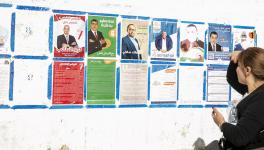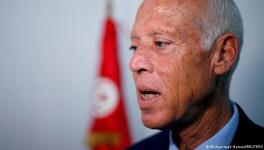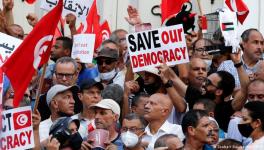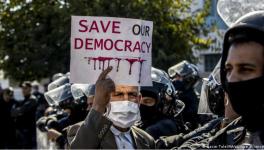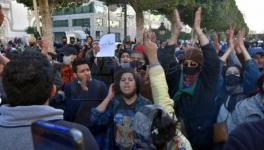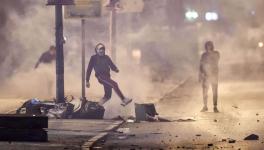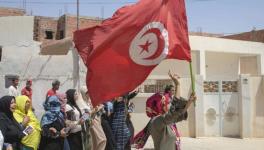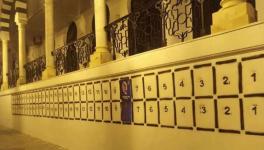Ali Jallouli: ‘The Tunisian People Are Against Absolute Autocracy’
Police violently repressed a protest in Tunisia on July 22 against the referendum on the constitution. Photo: Chahd Lina Belhadj / Meshkal
Tunisian President Kais Saied took the political crisis in Tunisia a step further in holding a constitutional referendum on July 25. Despite the low participation in the vote, less than 30% of the electorate, Saied has claimed the process as a concrete victory in favor of his proposed constitution. Progressives in the country have rejected the constitution and see it as the latest in a series of moves by the president to undermine democracy and establish autocratic rule.
The referendum was widely opposed by progressive and left groups across Tunisia, many of whom formed a coalition to boycott the vote and demand a return to democratic order. For many, the measures taken by Saied threaten to undermine the gains made in the 2011 revolution, many of which were concretized in the 2014 Constitution. One of the major protests the coalition organized days before the referendum was violently repressed by police and security forces. Several people were injured and hospitalized and 11 people were arrested.
The Workers’ Party of Tunisia has been on the front lines of this struggle in defense of democracy and the gains of the revolution. Peoples Dispatch spoke to Ali Jallouli, a leader of the Workers’ Party, to understand the significance of the referendum and the new constitution, and what this means for democracy in the country.
Jallouli highlights that one of the main achievements of the Tunisian revolution was “the significant change in the form of power by overcoming the authoritarian, dictatorial form that characterized the period before January 14, 2011, whether it was the era of General Ben Ali, Bourguiba, or even the monarchy that lasted for several centuries.”
The goals of the revolution have not only been subverted in the erosion of democratic institutions. Jallouli adds that the demands for economic justice for the people have yet to be fulfilled, and that in the last period there have been significant setbacks in the economic and social conditions of the Tunisian people. Record high inflation and enormous growth of the informal or parallel economy has meant that the majority of the masses have entered a situation of “despair and frustration”, which he argues has been taken advantage of by Saied to attack his political opponents but even he has failed to improve the economic situation.
He emphasized that despite the fact that according to Saied the constitution has been approved, the struggle is not over. He vowed that the Workers’ Party “as it struggled against tyranny and dictatorship in the era of Bourguiba and Ben Ali, will spare no effort in defending the aspirations of our people and the demands of the revolution. The Tunisian people carried out a clear revolution in terms of their economic, social, and political demands and in terms of their slogans and aspirations. We want to preserve the revolutionary spirit and defend the demands of our people.”
Read the full interview below:
Peoples Dispatch: Recently, Kais Saied, the president of Tunisia, organized a referendum on a new constitution which saw comparatively low participation from prior electoral processes. The Workers’ Party and other organizations have been involved in a campaign against the referendum, the constitution, and other moves by Tunisia’s president which they allege undermine democracy. Can you tell us a little bit about the context and why you are opposed to the constitution?
Ali Jallouli: From the beginning we were against the referendum and against the constitution promoted by President Kais Saied because we see it as part of the coup. As soon as the leader of the coup seized all of the authorities and institutions, it became clear to him that the most important step would be to freeze the work of the 2014 constitution by declaring that Tunisia’s crisis is a constitutional crisis and a new constitution is required.
In fact, we, along with many progressive and democratic forces, were aware that Kais Saied’s purpose stemmed from his desire to produce a new constitution that gives broad powers to the president. This is especially true given his struggle with the parliamentary majority of the Ennahda movement and its government. Since he reached the presidency at the end of 2019, it was not a struggle over economic, social policies, and programs, but rather a struggle over powers, including the powers of the president and the powers of the government and parliament.
Saied’s plan was to rewrite the constitution and then hold a referendum on it. This constitution gives imperial powers to the president. It makes the president the head of the executive authority and gives him control over parliament. In the new constitution, the parliament is no longer the body that prepares the budget and finance law, it is now the task of the president. Additionally, there is no oversight body over the presidential institution during the performance of its duties and it essentially has eternal immunity, whether during the performance of its duties or after it. This makes the president above accountability, which was never the demand of the Tunisian people. The demand of the Tunisian people during the revolt at the end of 2010 was for freedom and democracy. It was a revolution against the Ben Ali regime, which symbolized absolute autocracy, meaning that the Tunisian people are against absolute autocracy.
It must be added that the president essentially prepared the constitution on his own. The formal bodies that he formed were full of people close to him, whether it was constitutional law professors such as Sadiq Belaid, Amin Mahfouz and the parties loyal to him, who were assigned to make a formal consultation and met by organizing a few meetings in order to prepare a draft. But even this draft was scrapped in order for the president to prepare his own text, which does not contain a separation between powers. In fact, there is no recognition of powers, but rather it considers them as mere functions. There is no acknowledgment of the civil state, not even a mention that rights and freedoms should not be violated. There is the famous Chapter Five, which talks about the purposes of Islam, which are contextually intended to be the “purposes of Sharia”, and more important than that there are no guarantees about the state of law and freedoms.
For all these reasons, our natural and logical position is to be against the referendum and this constitution, and for this we organized, according to our abilities and capabilities, many struggles and protests, in the capital and regions.
In the context of efforts to raise awareness of the danger of the new constitution, a coalition was formed and adopted the name of the “National Campaign to Drop the Referendum”. Many civil organizations rejecting the referendum, such as the Human Rights League, the Journalists Syndicate, the Democratic Women’s Association, the Union of the Unemployed, etc. are among the progressive democratic organizations that joined.
The culmination of these activities was on Friday, July 22, when a huge gathering was organized on the main street in the capital, Habib Bourguiba or “The Revolution Street” with the participation of many parties and organizations. This gathering witnessed confrontations and terrible repression by the repressive forces, including the police of Kais Saied. The result was that 11 protesters, including activists from the Workers’ Party, were arrested and were subjected to all forms of violence. However, the solidarity they received from the human rights movement, the lawyers and the democratic movements was effective in forcing their release. On the same day, many militants were attacked in the regions of Sousse, Nabeul, Gafsa. Some cases were fabricated against labor activists under the pretext that they carried out field activity calling for the travesty of the referendum to be dropped.
PD: What does the 2014 constitution mean for movements in Tunisia? Why is it under attack?
AJ: The main achievement of the Tunisian revolution is the significant change in the form of power by overcoming the authoritarian, dictatorial form that characterized the period before January 14, 2011, whether it was the era of General Ben Ali, Bourguiba, or even the monarchy that lasted for several centuries. Another key gain was to expand freedoms in the country, and all governments without exception, which were formed after the escape of the tyrant Ben Ali, especially the governments of the Ennahda Movement and its allies, have tried to restrict and roll back. However, the response, vigilance, and seriousness shown by the progressive, revolutionary and democratic movements are what thwarted these efforts aimed at overthrowing important gains. Our people also achieved important gains of a social and political nature, including the 2014 constitution.
Although the drafting of the Constitution of 2014 was carried out by the Constituent Assembly, which had a majority led by the Ennahda movement, the great public pressure that took place from outside the assembly, in which progressives and women played an important and prominent role, was the reason behind imposing the 2014 constitution to be a modernist liberal constitution. This constitution saw the formalization and institutionalization of state entities, the recognition of equality between male and female citizens, and the stipulation of the important social demands related to education, health and social guarantees. There was also a consensus on the separation of powers, whether in the Constituent Assembly or on the street, the majority of people agreed on the need to turn the page on the presidential system, which is a system closer to individual rule, Thus, a modified parliamentary system was adopted, and the 2014 Constitution also contained some oversight bodies, including the Constitutional Court. The 2014 Constitution was in its entirety a modern democratic constitution, and of course it contained some loopholes, which were mainly related to the reactionary majority that was In Parliament, which fully controlled the formation of the bodies, including the electoral commission and others.
PD: Over 10 years ago the revolution triumphed and Ben Ali was forced out of office. What have been the major achievements in this period of democracy and what have been some of the recent setbacks?
AJ: As I said, the fundamental change consisted in imposing an important change in the form of power from an authoritarian, dictatorial form to a liberal democratic form, which was reached through the struggles and sacrifices of the people for the sake of public and individual freedoms. Freedoms, especially political freedoms for the masses, are vital because they give them an important weapon to defend their interests, their right to protest, and their demands to organize and the right to move.
However, the nature of the state, i.e. the class nature, is still the same as a client and dependent bourgeoisie tied to the world monopoly capital. It is a rentier bourgeoisie that does not produce wealth, but rather is limited to rent and quick profit. It is a corrupt bourgeoisie that utilizes corruption, tax evasion, the parallel economy, and the criminal economy, which considers the state as an expression of the interests of this class.
In this respect, there has been no change. Those parties and leaders that have been in government from 2011 to the present day were in agreement on the essence of economic and social policies as well as the connection with global monopoly capital represented by the International Monetary Fund and the World Bank. They have also supported full and total dependence on the European Union within the framework of the Association Agreement of 1995 and the ALECA Agreement to destroy what remains of the services sector and the agricultural sector. They have continued to sign agreements that destroy what is left of the economy and what remains in particular of social gains that concern services and social sectors such as health, education, transportation, and water and electricity distribution.
The economic and social conditions of the vast majority of the Tunisian people have not witnessed any change, and if they have changed, then it has been for the worse. This has gotten worse since inflation rates have reached 8.2% with high prices and scarcity of basic commodities such as vegetable oil, flour, sugar and others, in the cities as well as the countryside. This has been accompanied by the growth of the informal economy. Reports show that more than 60% of commercial activity in Tunisia takes place in this parallel economy, meaning the country’s dominant economy is more informal than regular.
The size of the debt and the various crises that the country is going through are just some of the manifestations of the widespread destruction that hit the social sectors. This situation is what made part of the popular masses enter into a state of despair and frustration, which is what Kais Saied exploited through his propaganda attack against his political opponents, against whom he carried out a coup on July 25, 2021, using a kind of acceptance and approval shown by an important segment of the masses, especially the impoverished and those who live misery, and whose hope was that their living conditions would change.
Kais Saied, after over a year of his absolute rule, has worsened the economic and social conditions during this period and there has been a significant decline in terms of freedoms gained. For these reasons, the referendum witnessed an approximate participation of only 25% of the electoral body consisting of more than 9 million. Of those who voted, about 92% voted yes and only 8% no. Yet, 75% of the electoral body did not vote, whether it was because of the logic of a boycott, as called for by our party and some other political and democratic forces, or because of resentment, indifference, and aversion to public affairs. In all cases, the participation of only 25% of the electoral body reflects a deep and real crisis for the populist project represented by Kais Saied and its constitution, and that it does not enjoy wide acceptance among the Tunisian people.
PD: How does the Workers Party plan to continue the struggle amid this repression and enclosures of democratic space?
AJ: Immediately after the end of the referendum, the party issued a statement in which it considered that the percentage of participation in this referendum reflects the reality of the predicament of the political crisis in Tunisia. We consider this constitution as an authoritarian constitution that paves the way for individual rule with a religious grounding because it is based on “Sharia”, which means that a sacred blessing will be given to tyranny and individual rule. The level of participation in the referendum is evidence that there is no acceptance, especially since a significant number of people boycotted the referendum, whether consciously based on a political stance or due to resentment, resentment and frustration, which is currently affecting an important segment of the Tunisian people, which is suffering under the weight of economic, social and living difficulties.
From this point of view, we consider this constitution does not have the necessary legitimacy, whether popular or related to voting, and its content is against the democratic and progressive aspirations of our people, which makes this constitution a failure and the genuine democratic logic in this case requires that the president submit his resignation. This is not our position only in the Workers’ Party, it is also the position of the National Campaign to Overthrow the Referendum Coalition, which includes five social democratic and leftist parties, who agreed that Tunisia after July 25, 2021 entered a new crisis, the crisis of legitimacy and legitimacy, and of course we in the Workers’ Party will continue to struggle and protest against the constitution.
One of the things that we should not neglect is that at the same time and in parallel with the protests related to the constitution, there is an ongoing discussion between the government and the International Monetary Fund (IMF) and they are on the verge of signing a new agreement that increases the country’s mortgage and liquidates the remaining partial gains related to the support fund and the sector. We will, of course, be at the forefront of all the progressive national, democratic and popular protest movements, and we will bear our responsibility in defense of freedoms and the economic and social demands of our people and in defense of national sovereignty that is being violated at the present time, especially since the ruler, by his order, Kais Saied, continues the same choices based on dependency, impoverishment, corruption and exploitation, we will defend the right of the unemployed and the marginalized, and all social groups and classes that made the revolution and that raised the slogan of jobs, freedom, and social dignity, and we will be with them and by their side in defense of their various demands.
The Workers’ Party, as it struggled against tyranny and dictatorship in the era of Bourguiba and Ben Ali, will spare no effort in defending the aspirations of our people and the demands of the revolution. The Tunisian people carried out a clear revolution in terms of their economic, social, and political demands and in terms of their slogans and aspirations. We want to preserve the revolutionary spirit and defend the demands of our people against populism and against the misinformation represented in the reactionary Ennahda Movement that destroyed the country and reinforced all the conditions for the growth of populism.
Our struggle is also against the descendants of the Ben Ali dictatorship, represented by the Constitutional Party, which is the descendant of the fascist party that destroyed Tunisia for more than five decades.
Therefore, our central slogan is no Populism, no Constitutional, and no KhawanJiyah, because we consider this trio to be the triangle of terror that perpetuates the options of dependency, impoverishment and exploitation.There is no way to for our people to be free, advance and win, without the defeat of these forces and without addressing all forms of regional and international interference. We also reject the tendencies of normalization with Zionist enemy that has increased during the era of President Kais Saied, who despite having proclaimed that “normalization is treason”, during his reign, Tunisia witnessed advances towards normalization. Clear examples of this include the presence of the Tunisian Minister of Defense at a NATO meeting, with the participation of the Zionist Minister of War.
We stand against all forms of cultural, sports, academic and commercial normalization with the knowledge, silence and complicity of the authorities. Of course, this matter is not acceptable to our people and we do not accept it. We will confront and will bear our historical responsibility as a party of the working class and the toiling masses in Tunisia that was established in order to participate in the struggle and lead the class, social and political struggle in the path to complete liberation and for the actual emancipation of our people.
This article was produced in collaboration with Madaar.
Get the latest reports & analysis with people's perspective on Protests, movements & deep analytical videos, discussions of the current affairs in your Telegram app. Subscribe to NewsClick's Telegram channel & get Real-Time updates on stories, as they get published on our website.









